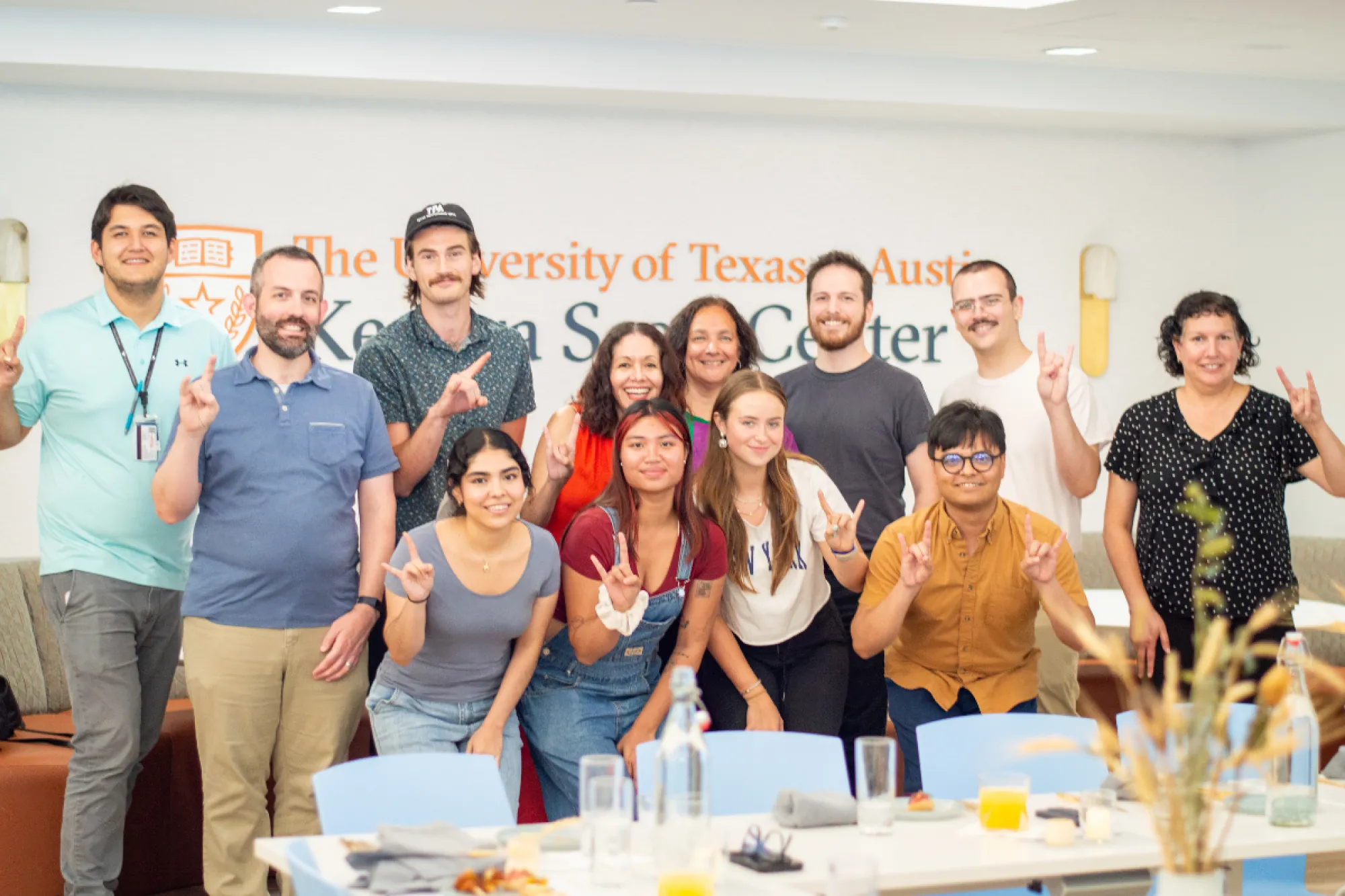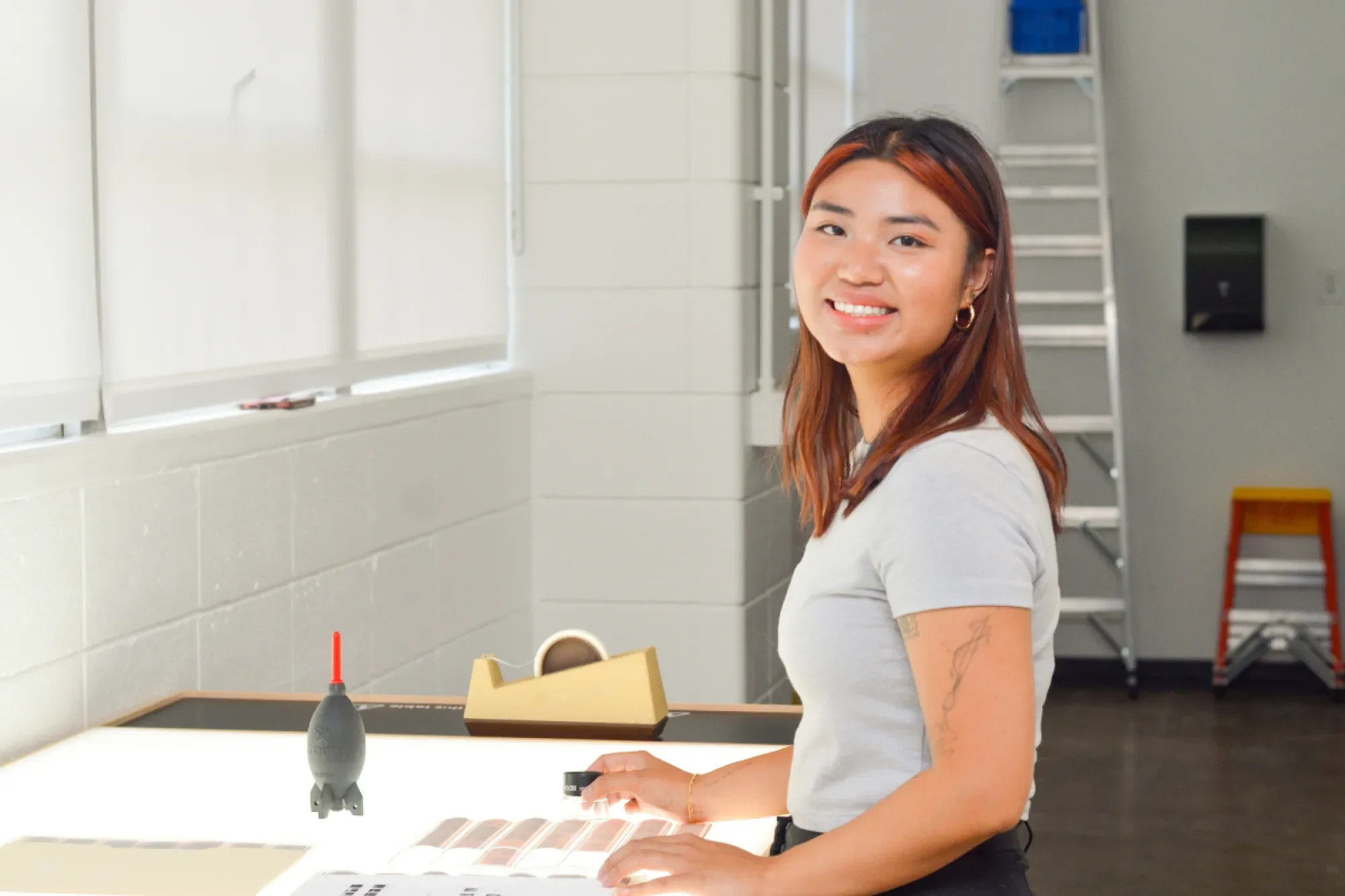Building Ladders to Success
Arts Administration Fellowship Program offers paid internships, professional development to Fine Arts students over 2 summers

by Alicia Dietrich
Internships for Fine Arts students are shown to be one of the most effective pathways for supporting career success after graduation, and a new program helps remove barriers and open new professional development opportunities for undergraduates through a two-year fellowship.
In spring 2024, the College of Fine Arts’ Office of Community Engagement and Public Practice and the Center for Creative Economies partnered to launch the Arts Administration Fellowship. The competitive, two-year fellowship was created to support paid internships for students enrolled in one of the college’s undergraduate majors who are also working toward a Minor in Arts Management and Administration. During summer 2024 the seven inaugural fellows received a fully funded internship with a University of Texas arts organization along with professional development programming that helped them make the most of their internship. This summer, the initial cohort was placed in campus internships at Landmarks, the Visual Arts Center, Texas Performing Arts, the Benson Latin American Collection, Art Galleries at Black Studies and the Harry Ransom Center.
The seven undergraduate Fine Arts students selected for the 2024 Arts Administration Fellows program moved into a second paid internship supporting arts organizations in the Austin community this summer. Also, a second cohort of students was selected in the spring and began their own on-campus internships this summer, and they’ll be placed in their community internships in summer 2026.
Studio Art senior Stacy Nguyen was in the first cohort of the program, and she was placed in an internship at the Visual Arts Center for her first year.
“I got to do a little bit of everything,” Nguyen said of the experience. “I did research for an exhibition. I chaperoned artist-in-residence Violette Bule. I helped scan Violette’s decade-long film collection on a flatbed scanner, and that was a very high honor. They were very fragile and very precious. I think I scanned over 20,000 photos over three months. It was very fun being able to hop around.”

Nguyen graduated in May, and she spent her second summer in the fellowship program interning in the arts education program at The Contemporary Austin.
“It’s very full circle for me,” she said. “It’s the first museum I visited when I came to Austin, and I’m big on nature and sculpture. As a sculptor myself, it’s the perfect intersection. I’m big on accessibility to art, so being able to work with the educational department and show kids in the next generation that there’s career possibility in the arts is huge.”
Music Composition junior SoJo Gonzalez started out as a cello player, but as her musical tastes expanded, she started building skills in music production and composition, and she formed a band with her sister. She decided to pursue the Minor in Arts Management and Administration to learn more about the business side of the industry and heard about the fellowship through a class in the minor. For her first summer in the fellowship, she interned on campus with Landmarks, where she helped book musicians for Landmarks’ Sounds in the Skyspace program, a series of performances held in The Color Inside, the James Turrell Skyspace on The University of Texas at Austin campus.
Austin is the Live Music Capital of the World, and you are going to need to be more than just a good player to survive here. - SoJo Gonzalez
This summer, she and fellow Music Composition student Jake Murphy both interned at Health Alliance for Austin Musicians, where they booked artists for the organization’s annual benefit concert to raise funds to provide health care to musicians in Austin. Both Gonzalez and Murphy felt the fellowship experience was valuable and should be available to more students.
“It’s a refreshing step in the right direction of musicians being educated in things outside of just practicing and performance,” Gonzalez said. “Austin is the Live Music Capital of the World, and you are going to need to be more than just a good player to survive here. You have to know how to speak for yourself. You need to know professional communication, and you need to know how the business works. That’s going to make you such a stronger candidate for so many things.”

